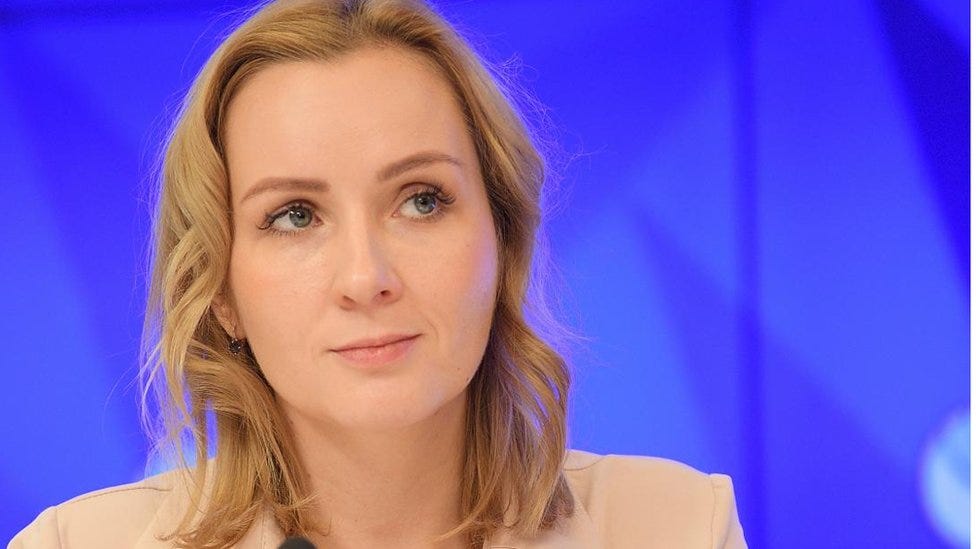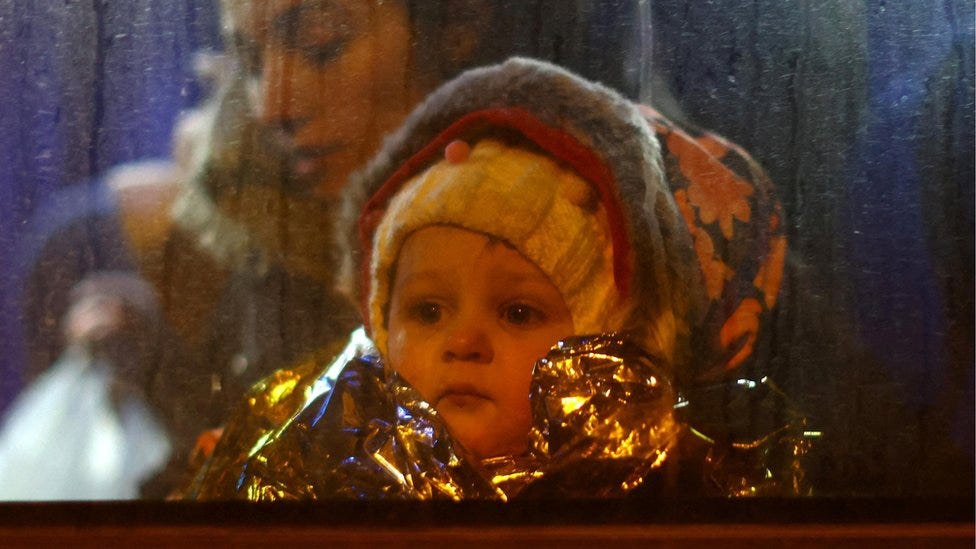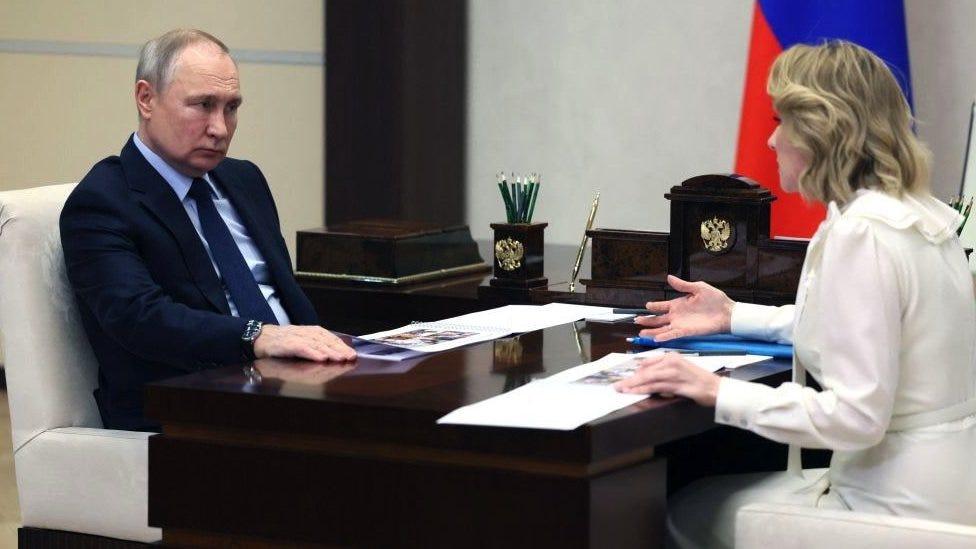Maria Lvova-Belova: Who is the Russian politician, wife of a priest and mother to many children, wanted by the International Criminal Court?
The ICC named the 38-year-old politician Maria Lvova-Belova alongside Vladimir Putin on a warrant for the "unlawful deportation" of Ukrainian minors.
By Nina Nazarova.

An arrest warrant issued by the International Criminal Court (ICC) for the Russian President Vladimir Putin showed The Hague's determination to prosecute Moscow for war crimes, in this instance, for the "unlawful deportation" of Ukrainian children to Russia.
Along with President Putin, his commissioner for children's rights, a politician until now was little known outside of Russia, Maria Lvova-Belova, was also named.
So who is she, and what is her role in the transfers, which, the ICC says, have been taking place since the start of the Russian invasion of Ukraine last February?
Ukrainian children 'evacuated' to Russia
Kyiv officials says there are nearly 20,000 Ukrainian children without parents in Russia, many of them taken against their will.

In many cases, according to the Ukrainian government, there are families who are desperate to be reunited. Around 300 children have already been returned to Ukraine in the past few months.
Ukraine and its allies stress that taking minors from occupied territories into another country amounts to genocide, aimed at destroying the Ukrainian nation, as the children are given Russian citizenship. This violates a 1949 Geneva convention, aimed at protecting civilians in an area of war.
"By taking our children, Russia is stealing our future," Ukraine's prosecutor general Andriy Kostin has said.
Some 380 Ukrainian children have been taken into care by Russian families - it means they are not formally adopted but getting them back could still be complicated.
The ICC claims that there are reasonable grounds to believe that the Russian children's rights commissioner, Maria Lvova-Belova, is personally responsible for the deportations and unlawful transfers, "having committed them directly or with the help of others".
Russia doesn't deny that many Ukrainian children ended up in Russia since the start of the "special military operation" - Russia's official term for the war in Ukraine.
But it has given smaller numbers than Ukraine: in October 2022 it referred to around 2,500 children. The BBC has asked Lvova-Belova's office for the latest figures and is awaiting a reply.
Russian authorities and the children's rights commissioner say the children who ended up in Russia are orphans and were evacuated for safety, rather than taken by force.
Maria Lvova-Belova, whose job it is to shape Russian state policies towards children, became a public face of these transfers, and has defended them as an attempt to save Ukrainian children from the areas of active combat and "integrate" them into Russia.
In her social media posts and public addresses she has claimed that taking Ukrainian children to Russia was in their best interests and stressed that the children are happy in Russia and many don't wish to return.
A former state senator, priest's wife and adoptive mother and guardian
Last summer Maria Lvova-Belova herself took into care a Ukrainian child from the southern Ukrainian city Mariupol. The city was taken over by Russian troops after months of bitter fighting.

Teenager Fillip Golovnya, according to Russian authorities, is an orphan. Ms Lvova-Belova frequently posts his photos on her social media accounts and says she knew he was "hers" when she first laid eyes on him soon after he was brought to the Moscow region along with a group of other Ukrainian children.
Fillip is not Lvova-Belova's only child - she is currently a mother of ten.
Five are her biological children and five more are adopted or in her care. Some of them are adults. The number of children in her care has fluctuated over the years and at one time was reported to have reached 18.
Originally from Penza, a city 750 km south-east of Moscow, 38-year old Maria Lvova-Belova became Russia's children's right commissioner in October 2021.
Before that she was a state senator, representing her region in the upper house of the Russian parliament. She is active in Russia's ruling party, "United Russia".
She is married to an Orthodox priest and is often photographed at religious services, wearing a headscarf.
She first became involved in social work focusing on children and young adults in the early 2000s, when she created a local organisation, called "Louis' Quarter".
This was reported to be in reference to the American jazz musician Louis Armstrong, who was born to a teenage mother and grew up in poverty. She ran several other similar projects before moving into politics.
Dismissing accusations
Maria Lvova-Belova has been under international sanctions from the early stages of Russia's invasion of Ukraine for her vocal support of President Putin. After the ICC issued an arrest warrant for her on 17 March, she dismissed the accusations.

"We don't know what cases the ICC has in mind. Arguments are abstract: no names, surnames, addresses, therefore we cannot check this information."
"If children have been separated, we will do everything to reunite them with their families."
On her social media she spoke about "warm words of support and solidarity" which she'd received from "colleagues, parents and subscribers in every corner of the country".
"We have nothing to hide, the truth is on our side," Maria Lvova-Belova wrote, adding: "Russia doesn't recognise the ICC and its decisions are meaningless for us."
At the same time, a lawyer Natalia Sekretareva, who works for the human rights group "Memorial" points out that Russia is a signatory to the Geneva Conventions, "therefore dismissing the accusations of the ICC doesn't hold up".
Last summer President Putin signed a decree, simplifying the process of giving Russian citizenship to Ukrainian minors. News reports and social media videos of Ukrainian children receiving Russian documents have been circulated by Russian officials, including Maria Lvova-Belova.
Experts inside Russia the BBC spoke to say handing out Russian passports to Ukrainians is happening on "a total, mass scale".
Ukraine has described handing out Russian passports to Ukrainian children as "legalised kidnapping".
A UN's special commission has warned in its report that placing Ukrainian children in Russian families and giving them Russian citizenship could have grave consequences for the preservation of these children's identities.
Maria Lvova-Belova stressed on numerous occasions that Ukrainian children need Russian citizenship for practical reasons - to be able to access health care and receive other assistance.
English version by Kateryna Khinkulova.
Read this story in Russian here.



